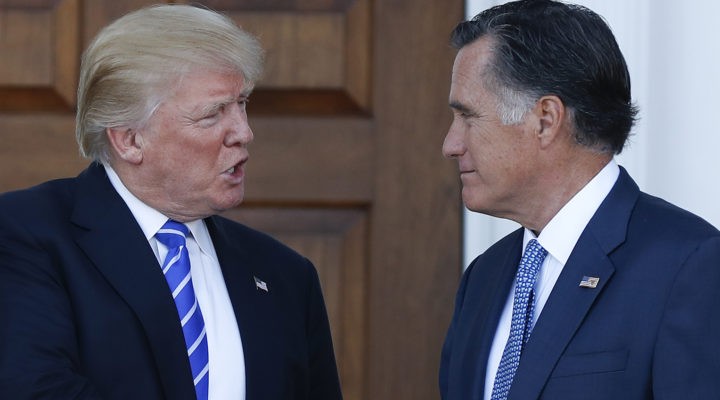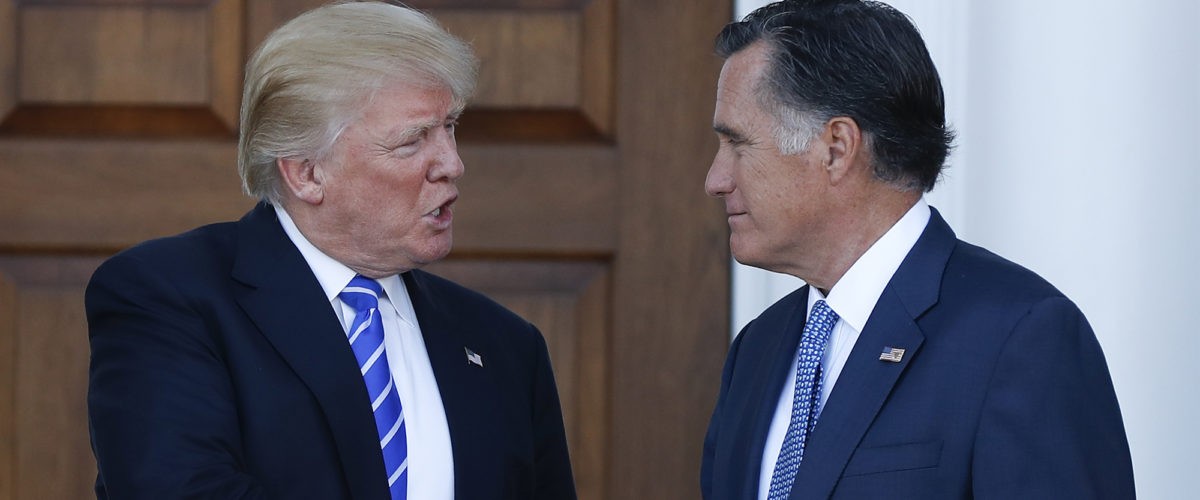Because of the way the Electoral College works in U.S. presidential contests, Mormons could play a decisive role in this year’s election. At play, the swing states of Nevada and Arizona and a surprising decreasing loyalty to the Republican Party in once-reliable Utah.
“While Mormons only represent about 6% of the population of Arizona, that may be enough to make a difference in the election,” wrote Jana Riess, Religion News Service senior columnist, on Aug. 31. “Trump won the state by just 3.5 percentage points in 2016, or just over 91,000 votes. But this year, Trump is trailing Biden by several points in the state, with many predicting a close election there.”
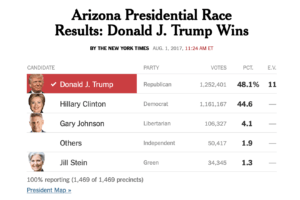
The New York Times summary of Arizona voting in the 2016 presidential election.
The polling site 270towin.com currently labels Arizona as a “toss-up state.” Trump won that state’s 11 Electoral College votes in 2016 without winning a majority of the state’s vote. He captured 48% of the vote, compared to Hillary Clinton’s 44.6% and the remaining 7% going to a variety of other candidates.
Why Arizona matters
Arizona has the third-largest Mormon population of any state, with 423,000 Mormons accounting for 6% of the total population — enough to sway a razor-thin margin in an election. (Three other states have a greater percentage of total population that are Mormon: Utah, Idaho and Wyoming.)
It is not surprising, then, that both the Trump campaign and the Biden campaign are working in Arizona and while there specifically reaching out to Mormons.
Vice President Mike Pence traveled to Mesa, Ariz., last month for the kickoff of a group called Latter-day Saints for Trump.
That organization’s website describes its purpose: “to mobilize and energize Latter-day Saints communities across the country to reelect President Donald Trump by focusing on and educating the community on the many successes of the Trump administration. Reelecting President Trump will ensure continued victories in school-choice reform, pro-life issues, judicial appointments, and religious freedom.”
On the other hand, some Arizona Mormons have formed a political action committee aimed at defeating Trump. Arizona Republicans Who Believe in Treating Others With Respect states its purpose: “We love our country and are deeply concerned with the direction it is taking. We understand the importance of determining which party will be in power. But, we are most concerned about which person will be in power. What is the moral character of that person? Is he truthful? How does he treat people? Does he acknowledge differences and treat others with respect? Is there an effort to be inclusive? Do we want our children and grandchildren to be like that person?
“Answering these questions, despite being lifelong Republicans — with no love for certain portions of the Democratic party platform — we will be voting for Joe Biden in November,” the site explains.
The Flake factor
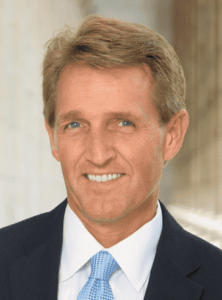
Jeff Flake
Prominent in the mix is former U.S. Sen. Jeff Flake, a Mormon and Republican and vocal Trump critic, who is from Arizona and is campaigning for Biden. Flake has impeccable Mormon credentials, earning two degrees from Brigham Young University and serving as an LDS missionary in South Africa and Zimbabwe in the early 1980s.
“I was a Republican long before the president ever called himself one,” Flake said in a video endorsement of Biden posted to YouTube. “We need to elect someone else, … someone who will stop the chaos and reverse the damage.
“I have never before voted for a Democrat for president,” Flake said, but added he’s voting for Biden this year because he believes the Democratic candidate will “approach the constitutional role with the reverence and dignity it deserves.” And, he said, “After the turmoil of the past four years, we need a president who unifies rather than divides.”
The Mormon vote elsewhere
Mormons in Utah number more than 2 million and account for 67.7% of the state’s population. With a deep Mormon heritage, Utah has the largest Mormon population of any state and the largest percentage of population identifying as Mormon.
In Utah in 2016, nearly 28% of the total vote in 2016 went to candidates other than Trump or Clinton.
That state’s six Electoral College votes most likely will go to Trump, although he won those electoral votes in 2016 with only 45% of the popular vote. Nearly 28% of the total vote in 2016 went to candidates other than Trump or Hillary Clinton.
The state with the second-largest percentage of population and the second-largest total number of residents who are Mormon is Idaho. The 445,000 Mormons there represent 26.4% of the total population. Current polling shows Idaho remains a “safe Republican” state in the 2020 election, with 60% of the likely vote going to Trump. Trump won that state’s four Electoral College votes with 59% of the total votes cast in Idaho in 2016.
Wyoming has the third-highest percentage of residents who are Mormon, with 67,5050 Mormons representing 11.53% of the state population. Wyoming remains a reliably Republican state. No current polls are available for Wyoming in the 2020 race.
Nevada has the fourth-largest Mormon population and the fourth-largest percentage of population that is Mormon. The 182,617 Mormons in Nevada represent 6.2% of the population. Nevada “leans Democrat,” according to polling data, with an average of all polling breaking 45% to Biden versus 40.5% for Trump. Clinton won the state’s six electoral votes in 2016 with 48% of the popular vote.
Why the changing Mormon vote matters
A recent report in Politico explained the context of this moment: “Before Trump became the party standard-bearer, Mormons had been among the most loyal GOP voters in the country. A 2010 Gallup survey found that ‘Mormons are both the most Republican and the most conservative of any of the major religious groups in the U.S. today.’”
But that changed in 2016 with the Trump nomination.
“Many Mormons found Trump blasphemous, and the church itself made thinly veiled statements condemning the candidate’s rhetoric on immigration and religious freedom,” Politico added.
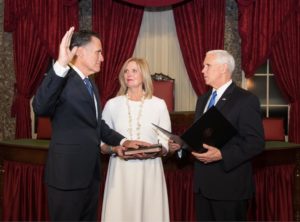
Mitt Romney being sworn into office by Vice President Mike Pence.
Things worsened for Trump when Utah Sen. Mitt Romney — arguably the most high-profile Mormon in the nation — voted for Trump’s impeachment during the December 2019 Senate trial. In so doing, according to reporting by the research firm PRRI, “Romney also became the first senator who has ever voted to remove a president of their own party. Romney cited his Mormon faith as a key driver in his decision.”
Despite a momentary downturn after voting against a sitting Republican president, Romney’s in-state approval ratings have quickly rebounded.
Mormonism — although often labeled a non-Christian cult by evangelical Christians — is a religious system built on conservative family values. Mormons pride themselves on their industry, thrift, parenting, church attendance and community service.
Mormon theology and ideology are the polar opposite of the personal character traits exhibited by Donald Trump. And while a majority of evangelical Christians have been able to overlook those character flaws to enthusiastically support Trump, the same has not been true among Mormons.
In a 2019 PRRI American Values Atlas study, a slim majority (55%) of Mormons nationwide reported favorable views of Trump, including 24% who held “very favorable” views. However, 40% of Mormons reported unfavorable views of the president. Among Utah residents — including the majority Mormon population plus non-Mormons — Trump’s favorability dropped to 46%, with 50% reporting unfavorable views. Only 16% of Utah residents reported “very favorable” views of the president.
By comparison, the same PRRI study found 73% of white evangelical Protestants expressed favorable views of Trump.
Frank Newport of the Gallup Organization recently concurred that “although traditionally Republican, Mormons are not nearly as strong in their support for Trump as evangelical Christians are.”
“Mormons give Trump a 60% approval rating in Gallup data so far this year, and several post-election surveys after the 2016 election suggested that Trump received about 60% of the Mormon vote,” he added. “However, that was a lower proportion of the Mormon vote for GOP candidates in previous elections (including, of course, the Republican candidate in 2012, Mitt Romney, who himself is Mormon).”
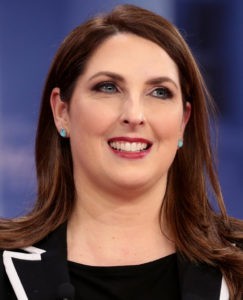
Ronna McDaniel
Republican National Committee Chair Ronna McDaniel, who is a Mormon, recently told Politico: “I do think Trump in 2016 — there were questions among not just Mormons, but other communities of faith.”
But things could be different in 2020, she said: “I think Mormons especially start looking at him as a different type of candidate than they did in 2016 because now he has a record.” She specifically cited the president’s stances on abortion and religious liberty.
Supreme Court battle
Earlier this week, Jennifer Walker Thomas, director of nonpartisanship for Mormon Women for Ethical Government, wrote a column for the Salt Lake Tribune telling Mormon women the course Trump and the Republican-controlled Senate are on regarding rapid replacement of Justice Ruth Bader Ginsburg on the Supreme Court is dangerous.
“At this moment, the interests of the president and those of the country are in direct, irreconcilable conflict,” she wrote. “The members of the Senate must choose between what is best for the president, personally, or what is best for the institutional integrity of the United States of America. We plead with our senators to put the nation first and defer the appointment process until the nomination can no longer be perceived as directly benefiting a deeply compromised and litigious president.”
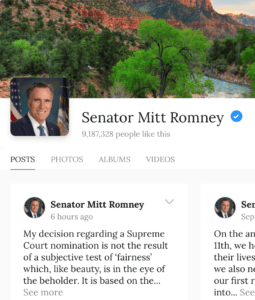 Ironically, Romney — who has boldly denounced Trump in other ways — said he would go along with Trump’s rapid nomination of a new Supreme Court justice before the election.
Ironically, Romney — who has boldly denounced Trump in other ways — said he would go along with Trump’s rapid nomination of a new Supreme Court justice before the election.
The Democrats’ pitch
A lengthy Aug. 15 article in the Deseret News, a publication owned by the Church of Jesus Christ of Latter-day Saints, chronicled the pitch Democrats are making to lure Mormon voters this year.
The paper reported on five LDS members who “quoted the Bible, Book of Mormon and Doctrine & Covenants as they worked to convince those tuning in to the national web-based event that Biden and the Democratic Party are aligned with the values of the church and country.”
“Put your shoulder to the wheel, choose the right and let’s get a new president we can all support,” the paper reported Scott Howell, chairman of the Biden campaign in Utah saying at a “Latter-day Saints for Joe” national town hall meeting.
The Deseret News reported that “Biden campaign officials are telling faith communities that his ticket has a ‘family-first, opportunity-focused agenda.’” And it quoted Joshua Dickson, national faith engagement director for the Biden campaign, saying at the rally, “I just want to kick off by saying how important outreach to the Latter-day Saint community is to the Biden campaign, because we believe that there is a strong overlap in shared values between what Latter-day Saints stand for and the agenda of Vice President Biden and Sen. Harris.”
A few days earlier, the Trump campaign had angered some Mormons with the launch of its Latter-day Saints for Trump website. Initially, the primary image on the site featured the names and photos of an advisory board over a backdrop of the Salt Lake Temple. Within a few days, that image was changed to remove the iconic temple.
“But the message was clear: people of note, including former Sen. Orrin Hatch, are trumpeting the accomplishments of President Trump for people of faith,” the paper explained.
Changing sides?
The Deseret News article further reported that “some church members have changed sides” in politics.

Rob Taber
“Some lifelong Latter-day Saint Republicans who nervously showed up at Iowa’s Democratic caucuses in February were surprised and relieved to find half their congregation there, said Rob Taber, national co-chair of Latter-day Saint Democrats of America. ‘They knew what we know. If President Trump gets another four years, they will be worse than the last,’ he said.”
Not so fast, countered Trump supporter Don Peay, who told the Desert News the GOP is still the right home for Latter-day Saints.
“If you look at what the president’s done — pro-life Supreme Court justices, a strong economy, a strong America, rescuing missionaries when they get stuck in foreign lands — President Trump has accomplished what the vast majority of Latter-day Saints want done,” he said.
And on the other hand, Riess, in her column for Religion News Service, warned there is a longer-term danger of the LDS associating itself with Trump.
“What Mormons do in this election matters — not only politically, in swing states such as Arizona, but in terms of the church’s own reputation and even its missionary efforts,” she wrote. “If church members vocally support such an unpopular and extremist president, they risk alienating more moderate individuals within the fold as well as potential converts — particularly the younger adults the church wants to add to its ranks, who support Biden over Trump by a 2-to-1 margin.”
 Mark Wingfield serves as executive director and publisher of Baptist News Global. He is a veteran journalist and pastor deeply involved in community service and the nonprofit sector in Dallas, where he lives with his wife, Alison.
Mark Wingfield serves as executive director and publisher of Baptist News Global. He is a veteran journalist and pastor deeply involved in community service and the nonprofit sector in Dallas, where he lives with his wife, Alison.
Related articles:
This year’s tug of war over the Catholic vote and why it matters

